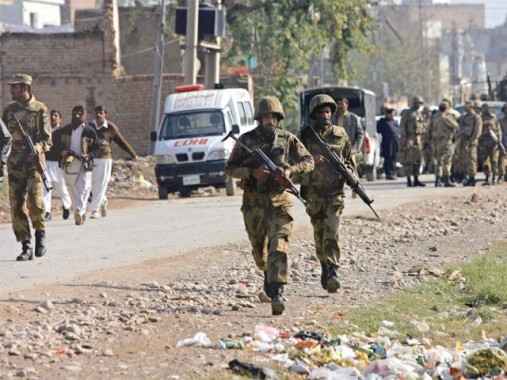
The morning of 16 December 2014 saw what was called an attack on the heart of our nation. Taliban gunmen attacked an Army-run school on Warsak Road Peshawar, killing at least 141 people out of which majority were children.
Former COAS and President of Pakistan Pervez Musharraf, in an interview to the AFP had warned about a potential India-Pak proxy war in Afghanistan. As US and NATO draw their forces from Afghanistan. India aims to create an anti-Pakistan Afghan state, and is using its influence to achieve this.
“That is another danger for the whole region and for Pakistan because Indian involvement there has an anti-Pakistan connotation. They (India) want to create an anti-Pakistan Afghanistan,” he said.
While India has tried to gain traction with the Tajik ethnic group, which dominates in northern Afghanistan, Pakistan has sought to use its leverage with the Pashtuns of the country’s south and east, thus initiating a proxy war in Afghanistan.
Through provoking Pakistan over the Kashmir issue by the violent exchange of fire on the Line of Control earlier this year, India has attempted to malign Pakistan internationally, while simultaneously Pakistan bears India-backed terrorist attacks on schools and public places internally.
No more, says the top military officials, as Chief of Army Staff General Raheel Shareef accompanied by ISI Director General Rizwan Akhtar visited Kabul to meet Afghan President Ashraf Ghani and ISAF Commander John Campbell. A demand for immediate arrest and repatriation of Mullah Fazlullah, chief of Tehreek Taliban Pakistan was made. Fazlullah was reportedly in contact with the Peshawar school attackers from Afghanistan during the assault. Pakistan made it clear that it will not tolerate the protection which terrorists enjoy on Afghan soil anymore, and in case the Afghan government failed to arrest the attack’s mastermind, Pak Army would consider other options including hot pursuit inside Afghan territory to arrest the TTP terrorists.
General Raheel told the Afghan president that Pakistan’s military could eliminate TTP sanctuaries in Kunar and Nuristan on its own but was showing restraint due to Afghanistan’s sovereignty and territorial integrity.
Retaliation from the Taliban was observed as a suicide bomb was detonated at the entrance of the Kabul Bank in the insurgency-racked Helmand’s capital, Lashkar Gah, on Wednesday. Ten people were killed in the attack. Twin blasts also striked Jalalabad killing two and wounding five people.
After the Peshawar carnage, Prime Minister Nawaz Sharif also approved the removal of the death penalty moratorium, which was imposed previously under international pressure.
To facilitate swift justice to those convicted in terrorism-related cases, General Raheel Sharif on Thursday signed death warrants of six hardcore terrorists. Dr Usman, the mastermind of the attack on GHQ in November 2009 and Arshad Mehmood who carried out an assassination attempt on former president Parvez Musharraf, were the first two who were hanged last Friday.
Following the lifting of the moratorium imposed on capital punishment in the country, Zakiur Rehman Lakhvi’s release on bail has remarkable timing. Lakhvi is the alleged operational head of Lashkar e Taiba, the group accused of orchestrating the 26/11 Mumbai Attacks.
No concrete evidence has been presented so far in any Pakistani court of Lakhvi being the mastermind behind the Mumbai Attacks. To prove its sincerity in eradicating terrorism, Pakistan had kept seven accused persons in detention despite a shred of evidence.
The granted bail expectedly sparked outrage from India, as Prime Minister Modi called it a ‘serious blow to humanity’. Giving in to the pressure, the alleged key planner has been detained under the Maintenance of Public Order (MPO).
Discuss this topic on Defence.pk









Assalam alaikum
An excellent article! The best move was the the meeting of the COAS and ISI chief with the Afghan government, this could be a bedrock on which more lasting and close relations between Afghanistan and Pakistan could be founded. Our righteous anger has not blinded us to the possibility of greater strategic gains through diplomatic overtures.